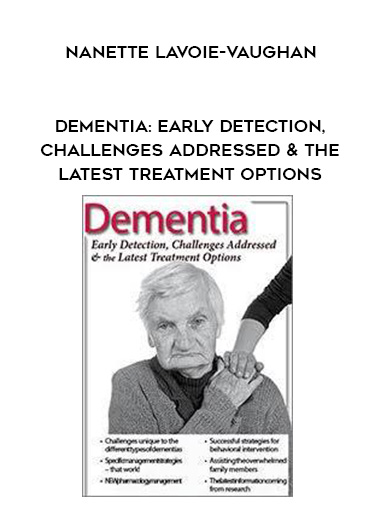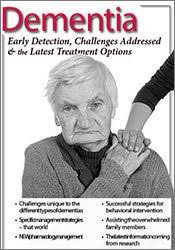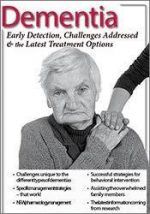
Nanette Lavoie-Vaughan – Dementia: Early Detection, Challenges Addressed & the Latest Treatment Options
- Challenges unique to the different types of dementias
- Specific management strategies – that work!
- NEW pharmacology management
- Successful strategies for behavioral intervention
- Assisting the overwhelmed family members
- The latest information coming from research
Every 67 seconds someone in the U.S. develops Alzheimer’s disease. It is estimated that there are 5 million persons with dementia and by 2050 there will be 10 million or more. Healthcare staff is challenged with providing safe and quality care for this vulnerable population – across all the various settings. You are expected to provide compassionate care while achieving optimal patient outcomes, maintaining a secure/safe environment, and assisting caregivers who may suffer from compassion fatigue.
In this seminar, Nanette Lavoie-Vaughan, MSN, ANPPC-C, DNP, will provide you with the latest available information and real practical tips related to the diagnosis and management of all types of dementia. This program includes strategies to help you and family caregivers deal with behavioral problems and the unique challenges dementia presents. The recording will be filled with case studies, interactive sessions and key video examples to learn from. Don’t miss this opportunity to learn effective new strategies to improve the care you provide to this patient population.
- Distinguish the differences between the various types of dementias.
- Explain the manifestations of various types of dementia.
- Choose appropriate culturally-sensitive and disease-specific management strategies.
- Differentiate between the psychotropic drug choices for dementia and associated depression, anxiety and behavioral problems.
- Evaluate useful and creative strategies to manage the unique challenges of dementia patients.
- Assist caregivers in managing care, making critical decisions and handling stress.
- Analyze available resources from primary care, home health, adult day services and long-term care.
- Determine when geriatric psychiatry services should be involved to optimally manage symptoms.
Types of Dementia & Diagnosis
- Controlling risk factors before diagnosis
- Getting the diagnosis early
- Alzheimer’s
- Lewy body
- Vascular
- Mixed
- Early onset
Management Strategies
- Alzheimer’s specific
- Lewy body specific
- Wandering
- Falls
- Nutrition
- Driving
- Home safety
- Environment
- Sleep patterns
- Bowel function
- Emergent situations
Pharmacology
- Acetylcholinesterase inhibitors
- Antidepressants
- Anxiolytics
- Antipsychotics
- The current challenge to reduce antipsychotics
Interventions for the Unique Challenges
- Aggression – verbal, physical
- Sexual inappropriateness
- Delusions/Hallucinations
- Agitation
- Racism
- Cultural differences
- Delirium
- Pre-morbid experiences and personality
Assisting the Overwhelmed Caregivers
- Non-pharmacological interventions
- Stress reduction
- Compassion fatigue
- Safety
- Making difficult decisions
- Respite
- Hospice/End of life care
- Helping children understand
- Working with low literacy and English as a Second Language caregivers
Resources
- Organizations
- Support groups
- Educational materials
- The latest practice guidelines
- Insurance and finance considerations
- Staff training
- Using geriatric neuropsychiatry services
What’s On the Horizon
- Research for early diagnosis and treatment
- Care facilities
- Aging in place
What is health?
The word health refers to a state of complete emotional and physical well-being. Healthcare exists to help people maintain this optimal state of health.
According to the Centers for Disease Control and Prevention (CDC), healthcare costs in the United States were $3.5 trillionTrusted Source in 2017.
However, despite this expenditure, people in the U.S. have a lower life expectancy than people in other developed countries. This is due to a variety of factors, including access to healthcare and lifestyle choices.
Good health is central to handling stress and living a longer, more active life. In this article, we explain the meaning of good health, the types of health a person needs to consider, and how to preserve good health.
In 1948, the World Health Organization (WHO)Trusted Source defined health with a phrase that modern authorities still apply.
“Health is a state of complete physical, mental, and social well-being and not merely the absence of disease or infirmity.”
In 1986, the WHOTrusted Source made further clarifications:
“A resource for everyday life, not the objective of living. Health is a positive concept emphasizing social and personal resources, as well as physical capacities.”
This means that health is a resource to support an individual’s function in wider society, rather than an end in itself. A healthful lifestyle provides the means to lead a full life with meaning and purpose.
In 2009, researchers publishing inThe LancetTrusted Source defined health as the ability of a body to adapt to new threats and infirmities.
They base this definition on the idea that the past few decades have seen modern science take significant strides in the awareness of diseases by understanding how they work, discovering new ways to slow or stop them, and acknowledging that an absence of pathology may not be possible.
Nanette Lavoie-Vaughan – Dementia: Early Detection, Challenges Addressed & the Latest Treatment Options
Readmore About : Nanette Lavoie-Vaughan









































Reviews
There are no reviews yet.